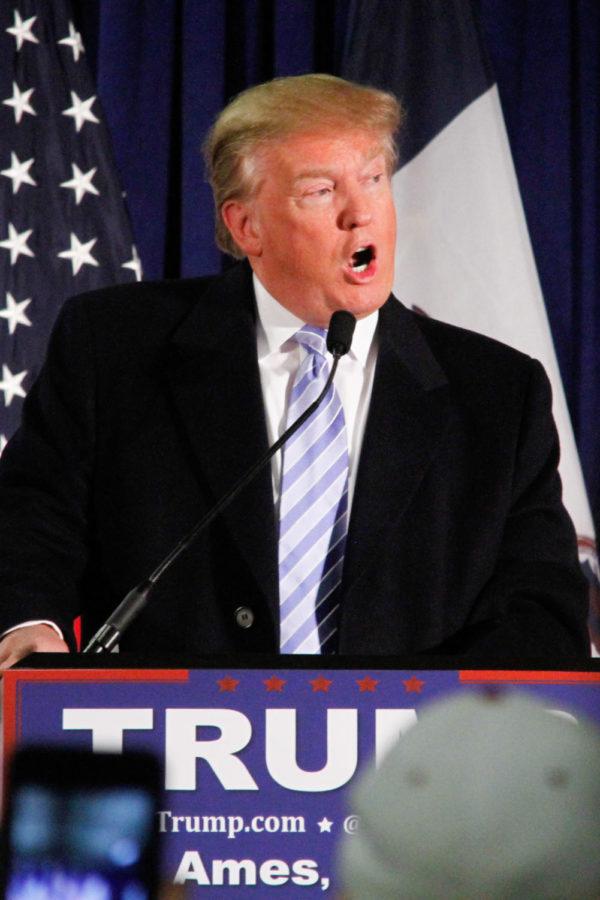- App Content
- App Content / News
- News
- News / Politics And Administration
- News / Politics And Administration / State
Clinton, Cruz lead in new poll from Iowa State/WHO-HD
January 27, 2016
Less than a week until the first votes are cast, Hillary Clinton and Ted Cruz lead the race in the Iowa Caucus, according to a new poll released from Iowa State University and WHO-HD on Tuesday.
Clinton has the support of 47.4 percent of likely caucusgoers, while U.S. Sen. Bernie Sanders is close behind at 45 percent. Former Maryland Gov. Martin O’Malley only registered less than 1 percent.
This is the second poll conducted by Iowa State and WHO, and the first poll showed Sanders with only 27.8 percent, signaling a surge in support over the last several weeks.
On the crowded Republican side, Cruz has support of 25.8 percent of likely caucusgoers. Donald Trump is second at 18.9 percent; Ben Carson is third at 13.4 percent; Marco Rubio is fourth at 12.3 percent; Rand Paul is fifth at 6.9 percent; Jeb Bush is sixth at 3.8 percent; 2008 caucus winner Mike Huckabee is seventh at 3.7 percent; and Carly Fiorina is eighth at 1.1 percent.
Rick Santorum, Chris Christie and John Kasich register less than 1 percent.
The first poll from December showed Carson in the lead with Rubio in second, Cruz in third and Trump in fourth.
The newest poll, conducted through phone interviews with 722 registered voters between Jan. 5-22, shows Trump with a surge of support on the Republican side.
“Trump has done an excellent job of motivating non-traditional Republicans and people who don’t typically vote to support him and attend his rallies,” said David Andersen, assistant professor of political science. “However, our poll has shown – twice now – that he is not the leading candidate among people who are the most likely to go out on caucus night.”
“Trump probably has more supporters than other Republican candidates overall in Iowa, but if those supporters don’t show up to caucus it just won’t matter. It is not just popularity that wins the caucus; it is turning out your supporters,” he said.
Even with the current standings, 34.2 percent still have yet to make up their mind.
“Between now and caucus night, any number of events and candidate developments can affect the outcome,” said Mack Shelley, university professor of political science. “Watch for any issues that catch fire just before the caucuses, and pay particular attention to any statements candidates make on important issues and last-minute campaign advertising designed to sway undecided voters.”
Candidate qualities
The poll rated outsider candidates Trump and Fiorina on leadership and compassion, and voters viewed Trump more favorably on leadership with 58.9 percent compared to Fiorina’s 57.4 percent.
Fiorina was the stronger candidate on honesty, with 64.3 percent compared to Trump’s 49.9 percent. She also rated higher on compassion with 61.7 percent compared to 25.6 percent for Trump.
Terrorism important to voters
Terrorism is now the most important issue to voters, with 21.2 percent of those responding saying it was the biggest issue. This is a shift from the first poll, where most said the economy was important.
“In light of the terror attacks in Paris and San Bernardino, concerns for national – and personal – security have definitely increased, as these results show,” said James McCormick, professor of political science.
“To be successful, presidential candidates will increasingly need to reassure Iowans – and Americans – that their policies will keep the country safe. Although economic concerns usually dominate the agenda in presidential elections, national security concerns are likely to be equally important for many voters throughout this election cycle,” he said.
The economy was still chosen as the most important issue by 18.6 percent dissatisfaction, with government and Congress next at 10.1 percent and the gap between rich and poor third at 8.9 percent.
Faculty from Iowa State’s political science department, the statistics department and the Greenlee School of Journalism and Communication collaborated on the poll.
Those departments, along with Iowa State’s Office of the Vice President for Research, the College of Liberal Arts and Sciences and the Carrie Chapman Catt Center for Women and Politics, as well as WHO-HD, are funding the research.







